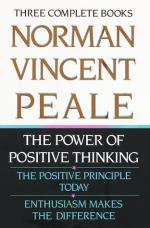|
This section contains 1,109 words (approx. 4 pages at 300 words per page) |

|
A long happy life, national acclaim, professional satisfactions, and accumulating wealth seemed to attest to the success of Norman Vincent Peale's blend of New Thought, psychotherapy, optimism, and Protestant Christianity. The phrase "positive thinking" became part of the national vocabulary, as Peale's books repeatedly topped the bestseller lists. While Pealeism, as his thought came to be known, exactly suited the American post-World War II mood, it also became the object of angry attack from academic theologians for two decades. Along with Billy Graham and Bishop Vincent Sheen (who often found himself introduced as "Norman Vincent Sheen"), Peale became one of the best known American clergymen of his time. His books constituted the greatest commercial success of religion in the middle of the twentieth century. His concepts linger on, though no longer labeled as "Pealeism," in the optimism and mind control techniques of...
|
This section contains 1,109 words (approx. 4 pages at 300 words per page) |

|


